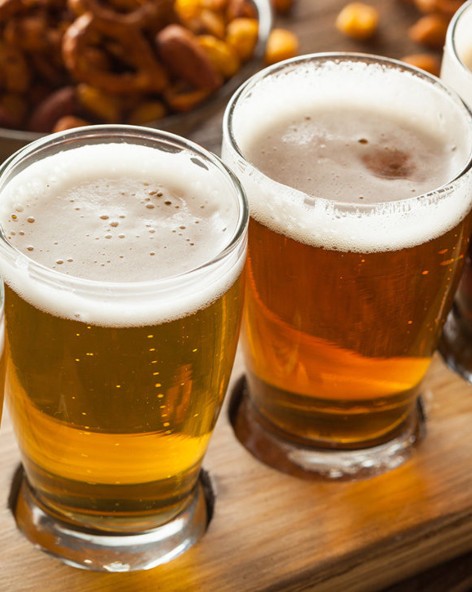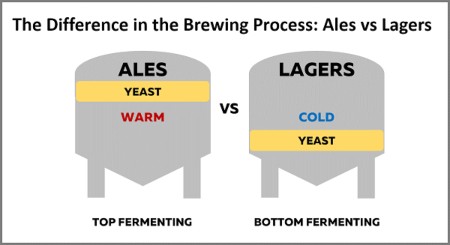

What is the difference between Lager and Ale?
First things first, every beer ever made is either a lager or an ale. Stouts, porters, IPA, Pilsners are all just sub-categories of Ales and Lagers. So what makes them different? It’s all about the yeast.
Ale yeast or Saccharomyces cerevisiae is top fermenting yeast and it is what makes all Ales. Saccharomyces carlsbergensis, now known as accharomyces uvarum is bottom fermenting yeast. Ales ferment at higher temperatures and are known for fruitiness, bitterness and higher alcohol output. They were here first, by about 9,000 years and make up a majority of beer styles.
Lager yeast is bottom-fermenting, and creates a light, crisp beer that is usually, USUALLY, lighter in alcohol. Lagers get their name from the German word ‘Lagern’ which means to store. Beer in Germany was traditionally stored in caves over the long summer months which kept the wort cold.

What is the Brewing Process for Lagers and Ales?
When wort (the sugary liquid of water and malts) is turned into beer it uses yeast to essentially eat the sugars and in turn burp out carbonation bubbles and alcohol. For ales this activity (fermentation) takes place at the top of the fermentation tank, in warm conditions (18°C-22°C) using an ale yeast which loves the warm temperatures. For lagers the same activity takes place at the bottom of the tank, in cool conditions (less than 12°C) using a lager yeast which prefers the cool temperatures to eat the sugars.
The outcome, the creation of beer, is the same but for ales the yeast is ‘busier’ meaning the time it takes to become beer is shorter, normally 4 weeks or less. For lagers in contrast the process is slower and will normally take 4 weeks or more to become beer.
So what gave lagers such a strong foothold in Germany? Germans took their beer very seriously. So serious in fact that in 1516 they passed the first ever food regulatory law which put into place very strict guidelines of what you put, how you made and when you made your beer. It is important to note, that laws of this nature were common place as far back as 1447. These laws were all designed to increase and protect the quality of beer production in Bavaria. The new law was called the Reinheitsgebot, or the German Beer Purity Law.
As with their beer recipes, the Germans had to make tweaks to their law. At the time it was not known what made sweet malty liquid turn into tasty beer so yeast was not in the original law (just hops, malted barley and water were included), but in 1556 a Munich city ordinance made way for the all-important organism. Lager and ale yeast were already being used, but we simple minded humans were not aware that there was a difference between what was making beer in the summer (warmer fermentation) or the winter (cold fermentation).
"Lager and ale yeast were already being used, but we simple minded humans were not aware that there was a difference between what was making beer in the summer ... or the winter."
—
Is There a Best Time of Year to Brew Beer?
There were some bright brewers out there that noticed that the beers that were made during the winter turned out to be cleaner and purer beers. So in 1553, all summer brewing was made illegal and Lagers now had their chance to thrive. From this point on most Northern German beer was brewed in the winter, and matured for weeks in caves. With only cold temperatures to ferment in ale yeast first became dormant and was eventually worked out of German brewer’s yeast cultures. Lagers would go on to dominate the world beer scene. Now 90% of all beer consumed is a lager. It is very important to point out, that these lagers of the 15th century were not golden pilsners. They were dark, smoky and cloudy. It will take another 300 years, and Englishman and little bit of luck to get to the pale crystal clear beers we consume today, but I think that is enough for today.
What Beer Should I Drink?
Choose Ale if you:
- Prefer stronger beers
- Like a fruity and sweeter beer
- Want to take advantage of health benefits
Choose Lager if you:
- Consume beer to be refreshed
- Prefer lower-calorie beers
- Like a clear and clean, finished beer